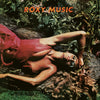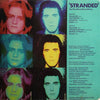







Roxy Music - Stranded (Half-speed Mastering)
[click here to see more vinyl by Roxy Music]
Bryan Ferry – vocals, piano, electric piano, harmonica, cover concept
John Gustafson – bass guitar
Eddie Jobson – synthesizers, keyboards, electric violin
Andy Mackay (as Andrew Mackay) – oboe, saxophone, treatments
Phil Manzanera – guitar, treatments
Paul Thompson – drums, timpani
Chris Laurence – string bass on "Sunset"
The London Welsh Male Choir – chorus on "Psalm"
Chris Thomas – bass on "Street Life"
Written by Bryan Ferry (all tracks), Phil Manzanera (A3), Andy Mackay (B2)
1 LP, gatefold jacket
Original analog Master tape : YES
Half-speed Mastering
Heavy Press : 180g
Record color : black
Speed : 33 RPM
Size : 12'’
Stereo
Studio
Record Press : Optimal Media GmbH
Label : Republic Records
Original Label : Islands Records
Recorded September 1973 at Air Studios, London
Engineered by John Punter
Produced by Chris Thomas
Remastered at Abbey Road Studios
Lacquer cut by Miles Showell at Abbey Road Studios
Originally released in November 1973
Reissued in May 2022
Tracks:
Side A:
- Street Life
- Just Like You
- Amazona
- Psalm
Side B:
- Serenade
- A Song For Europe
- Mother Of Pearl
- Sunset
Reviews :
“Without Brian Eno, Roxy Music immediately became less experimental, yet they remained adventurous, as Stranded illustrates. Under the direction of Bryan Ferry, Roxy moved toward relatively straightforward territory, adding greater layers of piano and heavy guitars. Even without the washes of Eno's synthesizers, Roxy's music remains unsettling on occasion, yet in this new incarnation, they favor more measured material, whether it's the reflective "A Song for Europe" or the shifting textures of "Psalm." Even the rockers, such as the surging "Street Life" and the segmented "Mother of Pearl," are distinguished by subtle songwriting that emphasizes both Ferry's tortured glamour and Roxy's increasingly impressive grasp of sonic detail.” AllMusic Review by Stephen Thomas Erlewine
Half-speed mastering. In half-speed mastering, the whole process is slowed down to half of the original speed. A typical 33 1/3 rpm record is cut at 16 2/3 rpm. The source material is also slowed down (reducing the pitch in the process) meaning the final record will still sound normal when played back. Slowing the whole process down allows more time, which means the end result sounds better and is more efficient — allowing engineering to minimize the effects of inherent limitations within the vinyl format. The result is a more accurate and more open high-frequency response in the half speed vinyl when compared with a normal speed recording.
Ratings :
AllMusic : 4.5 / 5 , Discogs : 4.15 / 5


